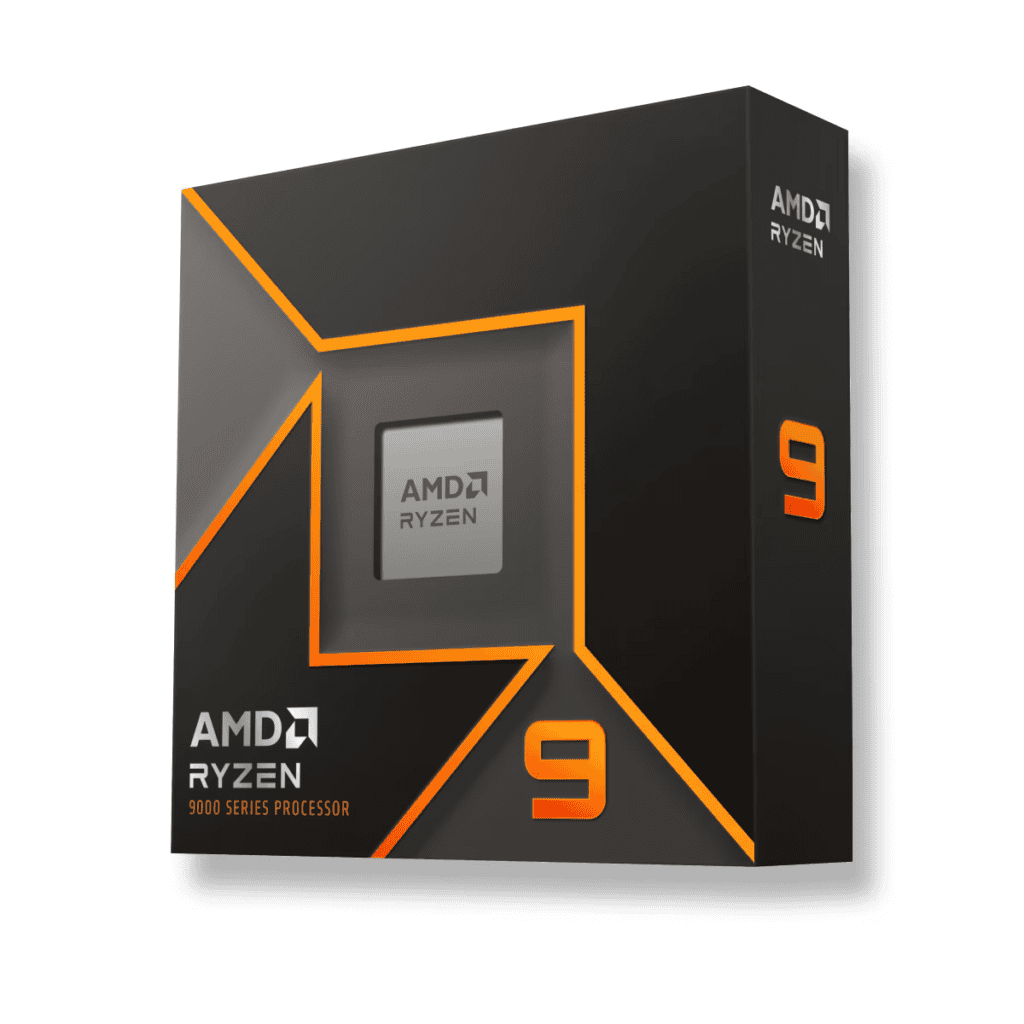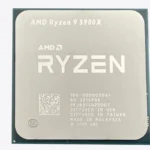AMD released two major batches of chips in 2024 with the 8000 series of APUs (with integrated graphics) and then released the Zen 5 architecture with the 9000 series of chips. The new Ryzen processors promise to significantly improve performance and efficiency. The AMD Ryzen 8000G Series has up to eight cores and 16 threads, offering powerful performance for gaming and productivity tasks. These desktop processors can handle intensive workloads with ease.
The AMD Ryzen AI 300 Series processors are integrated with neural processing units (NPU) capable of delivering up to 50 peak TOPS (trillions of operations per second). Laptops featuring these processors can handle advanced AI tasks more efficiently. The new Ryzen 9000 series, built on the Zen 5 architecture, offers incremental improvements over previous generations, pushing the boundaries of performance. This makes them an appealing option for users looking to upgrade their desktops for better performance, efficiency, and productivity.

AMD’s 2024 CPU Lineup
AMD had a busy 2024, releasing a variety of CPUs for desktop and laptop platforms. These processors catered to different needs and budgets, from budget-friendly options to high-end gaming and workstation CPUs.
Desktop Processors
Zen 5 Chips Released In 2024
| Name | Core Count | Performance Core Clock | Performance Core Boost Clock | Microarchitecture | TDP |
|---|---|---|---|---|---|
| AMD Ryzen 5 9600X | 6 | 3.9 GHz | 5.4 GHz | Zen 5 | 65 W |
| AMD Ryzen 7 9700X | 8 | 3.8 GHz | 5.5 GHz | Zen 5 | 65 W |
| AMD Ryzen 9 9900X | 12 | 4.4 GHz | 5.6 GHz | Zen 5 | 120 W |
| AMD Ryzen 9 9950X | 16 | 4.3 GHz | 5.7 GHz | Zen 5 | 170 W |
AMD expanded its desktop processor lineup with new additions to both the Ryzen 5000 and Ryzen 9000 series.
- Ryzen 5000 Series: AMD added two new models to its Ryzen 5000 series, the Ryzen 9 5900XT and Ryzen 7 5800XT. These processors are built on the “Zen 3” architecture and offer improved performance for gaming and everyday tasks.
- Ryzen 9000 Series: AMD introduced its next-generation Ryzen 9000 series processors based on the new “Zen 5” architecture. These CPUs offer significant performance gains over the previous generation, with higher clock speeds and improved efficiency. The lineup includes the flagship Ryzen 9 9950X, the Ryzen 9 9900X, the Ryzen 7 9700X, and the entry-level Ryzen 5 9600X.
Laptop Processors
AMD also released new mobile processors designed for laptops, focusing on both performance and power efficiency.
- Ryzen 8000G Series: These processors combine “Zen 4” CPU cores with integrated Radeon graphics, offering a balanced solution for gaming and everyday use in laptops. They are designed to provide a smooth and responsive experience for both work and play.
AMD’s 2024 CPU Releases
| Processor Series | Architecture | Key Features | Target Market |
|---|---|---|---|
| Ryzen 9 5900XT / 5800XT | Zen 3 | Improved performance, gaming-focused | Gamers, mainstream users |
| Ryzen 9000 Series | Zen 5 | Significant performance gains, high clock speeds | Enthusiasts, gamers, content creators |
| Ryzen 8000G Series | Zen 4 with integrated Radeon graphics | Balanced performance and power efficiency | Laptops, mainstream users |
AMD Ushers in a New Era of Processing Power
Ryzen 9000 Series: The Zenith of Zen 5
AMD has unveiled its Ryzen 9000 Series desktop processors, the first to harness the cutting-edge Zen 5 architecture. These chips promise a 15% performance boost over their Zen 4 predecessors, setting new standards for desktop computing. The Ryzen 9 9950X leads the pack with 16 cores and a blazing 5.7 GHz maximum boost frequency, while other models offer various core and thread configurations to cater to diverse needs.
Enhanced Efficiency and AI Capabilities
AMD’s Ryzen 7040 Series for laptops showcases the Ryzen AI engine, the world’s first dedicated AI hardware in an x86 processor. This innovation significantly accelerates AI workloads, ushering in a new era of AI-powered applications on laptops.

EPYC Processors: Powering the Data Center
AMD’s 5th Gen EPYC server processors, slated for launch in the second half of 2024, are set to dominate the data center landscape with unparalleled performance and efficiency. These processors are engineered to tackle the most demanding workloads, from high-performance computing to AI and machine learning.
Table: Key Features of AMD’s 2024 CPU Lineup
| CPU Series | Target Market | Key Features |
|---|---|---|
| Ryzen 9000 Series | Desktop PCs | Zen 5 architecture, up to 15% faster than Zen 4, various core/thread options |
| Ryzen 7040 Series | Laptops | Ryzen AI engine, accelerated AI performance |
| 5th Gen EPYC | Servers | Unmatched performance and efficiency for demanding workloads |
With its 2024 CPU lineup, AMD is not just pushing the boundaries of performance; it’s redefining what’s possible in computing. Whether you’re a gamer, content creator, or enterprise user, AMD’s latest processors offer a compelling blend of power, efficiency, and innovation.
Key Takeaways
- AMD Ryzen 8000G Series excels in both gaming and productivity.
- Ryzen AI 300 Series processors integrate powerful NPUs.
- Ryzen 9000 series shows incremental improvements with Zen 5.
Technical Advancements and Performance
AMD’s 2024 Ryzen CPUs introduce several significant improvements and capabilities. These advancements cater to both performance enthusiasts and efficiency-focused users.
Zen 5 Architecture Innovations
The Zen 5 architecture is the core of AMD’s latest processors. It uses 4nm technology, offering increased transistor density. This means better performance and efficiency. Zen 5 processors also feature more cache, further enhancing speed and reducing latency.
The improvements in the instruction per cycle (IPC) metric are noteworthy. Users can expect up to a 16% increase in IPC, leading to faster processing times. Zen 5 also has improved branch prediction and execution engines. These enhancements make it a strong option for both gaming and professional tasks.
Performance Metrics and Improvements
AMD’s Ryzen 9 9950X is a highlight with 16 cores and 32 threads. Its boost clock reaches up to 5.7GHz. This high frequency allows for rapid computing tasks.
In terms of memory, the 9950X includes 80MB of combined L2 and L3 cache. This larger cache size reduces delays in data access. Performance metrics show significant gains in various applications, from gaming to complex simulations. AMD’s claims of a 16% IPC uplift seem evident in real-world performance tests.

Efficiency and Thermal Design Power
Efficiency is crucial in CPU design. Zen 5 architecture focuses on reducing power consumption while maintaining performance. The Thermal Design Power (TDP) of these CPUs is optimized to ensure they run cooler. This helps in avoiding thermal throttling during extensive tasks.
Zen 5 processors also include advanced power management features. These features allow dynamic adjustments to balance performance and power use. As a result, users can expect longer battery life in mobile devices without compromising on speed or responsiveness.
Overclocking and AMD EXPO™ Technology
Overclocking is a major attraction for enthusiasts. Zen 5 processors support substantial overclocking headroom. This allows users to push their CPUs beyond the stock settings for better performance.
AMD EXPO™ Technology makes overclocking accessible and safe. It provides predefined overclocking profiles that optimize settings automatically. Users can use simple tools to adjust performance parameters without deep technical knowledge. This empowers both new users and experienced ones to tailor their systems effectively.
AI Capabilities and Ryzen AI
AI capabilities are embedded in the new Ryzen 2024 CPUs. The AI Engine within these processors enhances performance in AI-driven applications. Ryzen AI can boost tasks involving machine learning, data analysis, and other AI workloads.
These AI features support real-time adjustments and optimizations. This leads to improved efficiency and responsiveness in various applications. Whether for gaming, content creation, or professional software, Ryzen AI’s capabilities simplify complex tasks and reduce manual tuning, making the technology accessible to everyone.

Frequently Asked Questions
This section covers key information about the AMD Ryzen 2024 CPUs, including release dates, specifications, pricing, performance improvements, compatibility, and how they fit within the current lineup.
What are the release date and availability details for AMD Ryzen 2024 CPUs?
AMD Ryzen 9000 CPUs are expected to launch in July 2024. Availability should follow shortly after, with major electronics retailers likely to carry the new models.
What specifications and features distinguish the AMD Ryzen 2024 CPUs from previous generations?
The Ryzen 2024 CPUs feature the Zen 5 architecture. They include up to eight cores and 16 threads. These processors promise enhanced performance, efficiency, and gaming capabilities compared to previous generations.
How does the pricing of the AMD Ryzen 2024 CPUs compare to earlier models?
Pricing details for AMD Ryzen 2024 CPUs have not been fully released yet. Historically, new models may have higher initial prices than older models. Specific pricing should be available closer to the launch date.
What improvements have been made to performance in AMD Ryzen 2024 CPUs for gaming applications?
AMD Ryzen 2024 CPUs are designed to deliver enhanced gaming performance. They include new architectural improvements which result in faster processing speeds and better power efficiency, making them ideal for gaming and content creation.
What are the compatibility considerations for AMD Ryzen 2024 CPUs with existing motherboards?
The new Ryzen 2024 CPUs are expected to be compatible with current motherboards that support Zen 4 processors. However, it is recommended to check with motherboard manufacturers for BIOS updates to ensure full compatibility.
Which generation of AMD Ryzen processors do the 2024 models represent, and how do they fit within the current lineup?
The AMD Ryzen 2024 CPUs are part of the Ryzen 9000 series, categorized as the latest generation in their lineup. They succeed the Ryzen 7000 series and focus on offering significant improvements in performance and efficiency.







